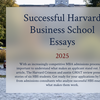When Eliot House was first opened, there was maid service in the rooms, tablecloths in the dining hall and waiters served students their meals from a menu.
This pristine image of wealthy young men downing cheri and porte wine has stuck with Eliot throughout numerous attempts by College administrators to break down house stereotypes.
While lacking the lavish amenities of the past, one former Eliot resident says that as recently as three years ago, the house still carried a vestige from its image as home to Harvard's snobbish elite.
"You walked into the dining hall and everyone was blond and they looked at you like 'what are you doing there,'" says Aaron M. Cheng '94.
But Richard G. Abramson '94 hastily adds that it is difficult to define Eliot's image by simply looking to its stereotype.
"It was really hype," Abramson says. "Our class was pretty diverse. We were a random class. The house had an effect on us--we were really proud to be part of Eliot."
Abramson says that while randomization will likely change the character of the house, Eliot's traditions may provide a foundation for house unity under the new system.
"It would be a real shame if [house pride] died out," Abramson says.
But current Eliot resident Julie H. Park '97, who is the co-chair of the house's annual charity skating show An Evening With Champions, says that Eliot's image has already undergone a significant transformation.
"I would say that from the people I've met, the traditional stereotype of being the final club elite is not accurate," says Park, adding that one of her roommates wanted to choose Eliot because of its "beautiful" architecture.
Nonetheless, long-standing traditions like An Evening With Champions may provide a rallying point for house spirit in the new era of randomization.
"A lot of people identify [An Evening With Champions] as being a very important part of the house," says Park, who is a Crimson editor. "It's very much a house activity."
In addition to the 27-year-old skating show, Eliot has a long tradition of housing public service activities. The House and Neighborhood Development program (HAND), for example, had its birth in Eliot.
At a recent house dinner, Helen M. Fernald, daughter of Eliot's first master, presented her father's rowing oars to the house.
Fernald says that when she was living in Eliot during the 1930s, the house was reasonably diverse, but it was never close-knit.
"The only thing father did was make sure [the student choices] weren't slanted," Fernald says.
In order to gain admission to the house, young men had an interview with the master where they discussed their academic and extracurricular interests.
The interviews, held under the first two masters of the house, Roger B. Merriman, Class of 1896 and John H. Finely Jr. '45, could be nerve wracking. Merriman's daughter, Fernald, says her father could be "terrifying--he was quite tall."
Each of the two masters worked to build a house of distinction. Merriman, a Rhodes scholar and an avid crew fan, established Eliot as a rowing powerhouse with unquestionable dominance in the College's crew cup competition.
Fernald, one of the only women allowed in the house after 5 p.m., said the traditions of Rhodes Scholarships and crew were part construction and part luck.
"Eliot House has always been known for crew," says Lucy Fernald. "Father was a Rhodes scholar. I think the students probably knew that and flocked to him."
Under Finely, the house continued to build a reputation for turning out Rhodes Scholars; one year, 12 of the 18 Rhodes Scholars were from Harvard, and 11 of those were Eliot House residents.
"It is certainly the case that John Finley quite consciously built a kind of house," says Secretary of the Faculty of Arts and Sciences John B. Fox Jr. '59. "Rhodes scholarship in those days being awarded for athletic participation, he had a built-in corner on the market."
Neither of these factors has been true recently, as Dudley House has risen to prominence in crew and the Rhodes Scholars have been distributed.
But the reputation of elitism has lived on, and former house residents usually admit to Eliot's "snobby reputation" even while denying it exists.
Helen's husband, Mason Fernald '40, who was an Eliot resident, says the layout of the dorms "had a segregating effect."
"There was a lot of joking with your own little group," Fernald says. "I hardly knew the guys down the hall.... We all had private baths and rooms."
Whatever the architectural make-up of the house, current Master Steven A. Mitchell says that the caring nature of the Eliot community will welcome any sort of student that is designated to live in the house.
"The House [is] a community that cares about its members, individuals who in turn care about the broader community," Mitchell writes in an e-mail message. "Such qualities make the house a place worth caring about."
Read more in News
The Future of RandomizationRecommended Articles
-
Undefeated Eliot Nips Lowell, 3-2Copy Coppage's goal in the first fifteen seconds nudged unbeaten Eliot over previously undefeated Lowell, 3-2, in an interhouse hockey
-
Dunster Attack Smothers Eliot, 51-0; Three Teams Tied for Touch TitleThe Dunster House touch football team shut out Eliot's lumbering Elephants yesterday, 51-0, in a sparkling show of offensive speed
-
Two Eliot Teams Ahead In Athletic StandingsEliot House, with two of its three teams undefeated, is the overall leader in intramural competition after three weeks. Eliot
-
Speaking Ex CathedraS TAGING THIS hyper-intellectual verse play is a risky venture as best in these postlapsarian times. Awash in his hard-won
-
Pres. Eliot's Union Lecture MondayPresident Eliot will deliver an address on "Diversity in Family, College, and State" in the Living Room of the Union.
-
CommunicationThe Harvard Crimson assumes no responsibility for the sentiments expressed by correspondents, and reserves the right to exclude any communication













